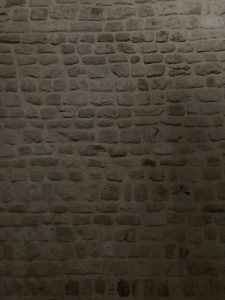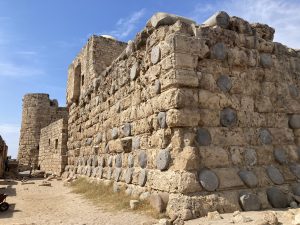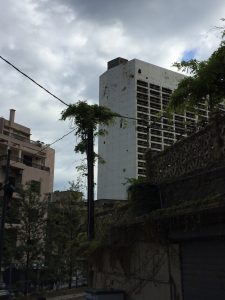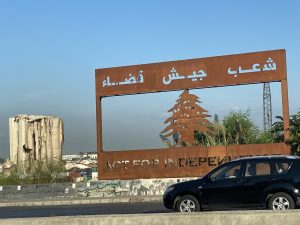Lebanon: 3 Walls, Bridges & Silos
Why on earth have I posted a photo of a blank, stone wall in the blog post? I did so because it is a sad symbol of something very significant.
 It’s found in a church in the city of Sidon. In fact it divides the church in half and dates from the time when the Greek Catholic Church, otherwise known as the Melkite Church, split from the Orthodox church. To mark the split the church was simple divided in two with a huge stone wall separating the two halves. It seems a long way from St. Paul talking about the ‘dividing wall of hostility’ being broken down in Christ (Ephesians 2:14).
It’s found in a church in the city of Sidon. In fact it divides the church in half and dates from the time when the Greek Catholic Church, otherwise known as the Melkite Church, split from the Orthodox church. To mark the split the church was simple divided in two with a huge stone wall separating the two halves. It seems a long way from St. Paul talking about the ‘dividing wall of hostility’ being broken down in Christ (Ephesians 2:14).
 We saw the wall not long after meeting Archbishop Elie Haddad of the Melkite Church. He is a delightful man who works hard for Christian unity today. Nonetheless the wall still stands – and stands as a powerful reminder that Lebanon is still a deeply divided country, with multiple different communities living alongside one another, rather in silos, often with little connection between them.
We saw the wall not long after meeting Archbishop Elie Haddad of the Melkite Church. He is a delightful man who works hard for Christian unity today. Nonetheless the wall still stands – and stands as a powerful reminder that Lebanon is still a deeply divided country, with multiple different communities living alongside one another, rather in silos, often with little connection between them.
The fruit of that is seen in another wall. In downtown Beirut, alongside gleaming skyscrapers repaired after the harbour explosion, there still stands an old hotel, a relic of Lebanon’s brutal civil war, still carrying the scars of shell holes. It’s too badly damaged ever to be repaired, but too precarious to be demolished. So it still stands, like the wall in Sidon, as a sign of a divided, siloed society.
People in the West haven’t always helped of course. We also went to the castle on the harbour in Sidon. It’s fascinating in structure. The circles you can see in the walls are old Roman pillars there were used in its construction to reinforce them.
But who built the castle? It was the Crusaders, who came here, armed, to impose their will on the Muslim population. Nor did the local Christians particularly welcome them. I am well aware of the irony, looking at the Crusader walls, of me coming to this country to promote Freedom of Religion of Belief (FoRB) when people whom many here would regard as my forebears came here to do the exact opposite.
The idea of breaking out of silos is in one way unfortunate. Beirut is still suffering from the terrible explosion of the storage silos in the port area. As you can see from the picture the entire side of the structure was blown out causing terrible destruction and loss of life. And that was followed by a near total collapse of Lebanon’s economy. And no solution to that is in sight while different communities are still deeply divided and unable to come together to form a government.
 Nonetheless I’m convinced that breaking down walls and silos in a society like this – and the UK’s – is vital. I do believing that promoting FoRB is a powerful means of doing so. And I salute the many people here who are committed to doing so.
Nonetheless I’m convinced that breaking down walls and silos in a society like this – and the UK’s – is vital. I do believing that promoting FoRB is a powerful means of doing so. And I salute the many people here who are committed to doing so.
While we’ve been here Israel and Lebanon have settled their long running maritime border dispute – which is encouraging given there are no diplomatic relations between the two countries. Please God that might be a sign of better things to come.


